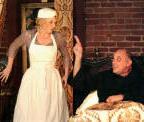SITE GUIDE
SEARCH
ADVERTISING AT CURTAINUP
REVIEWS
FEATURES
NEWS
Etcetera and
Short Term Listings
LISTINGS
Broadway
Off-Broadway
NYC Restaurants
BOOKS and CDs
OTHER PLACES
Berkshires
London
California
New Jersey
Philadelphia
Elsewhere
QUOTES
TKTS
PLAYWRIGHTS' ALBUMS
LETTERS TO EDITOR
FILM
LINKS
MISCELLANEOUS
Free Updates
Masthead
Writing for Us
A CurtainUp Los Angeles Review
Grand Delusion
By David Avery
| All of France mourns the loss of your son-of-a-bitch Archduke. — French General Fafou to Austrian Count Rumpledorf.
|

Amanda Detmer and Kurt Fuller in Grand Delusion
Picture by Ed Krieger |
The plot is a combination of the real-life political motivations of Austria-Hungary, Germany, France, Russia, and England right before the war, as translocated to the characters in the play (some real, some based on real people, all absurdly exaggerated). The Austrian Archduke Franz Ferdinand has just been assassinated, supposedly by Serbian operatives. Austria's foreign minister Count Rumpledorf (Timothy Omundson) pays a visit to dignitaries in both France and Germany (Eric Stonestreet's General Fafou and Kurt Fuller's Kaiser Wilhelm II, respectively). He warns them of Austria's impending invasion of Serbia, and tries to neutralize France's involvement while eliciting Germany's support. Meanwhile, Czar Nicholas II of Russia (Xander Berkeley) has been apprised of the impending attack of Serbia and commits to supporting his fellow Slavs on the advice of his stable hand Podnov (Brad Raider). The Czar sends Podnov as his representative to a summit meeting of France, Austria, and Germany. The men are soon joined by Venetia, Duchess of Shrewsberry (Amanda Detmer) who represents England and informs Wilhelm privately that Belgium and France are off-limits. Podnov, though he finds himself disparaged and ignored due to his lowly status and lack of hereditary title, desperately tries to stave off an impending war that looms larger and larger.
Since the outcome of these "events" are not in doubt, the play rests on the performances of the actors, who deftly rise to the challenge. For the most part, the portrayals are broad and slapstick. Omundson's Count Rumpledorf may as well be twiddling his mustache as he tries to manipulate the various powers into authorizing an invasion, with lines like "We just want a tiny bit of un-peace." Berkeley plays Czar Nicholas II as a bumbling fool, with a hint of the cowardly lion, who relies on everyone else around him to run the government. "My wife and Rasputin say the Russian army is in great fightin' shape!" he tells Podnov, who has been his military council throughout the crisis.
The centerpiece of the craziness is Fuller's Wilhelm II. His unmatched megalomania and paranoia are at the heart r of the other dignitaries' machinations, and everyone must tolerate his ridiculous demands (which include addressing him as "The Kaiser" and talking to the mounted head of a wildebeest). Even with lines like "The strength of Germany is in its strength," Fuller somehow makes Wilhelm likable in a daft way, even as he is threatening people with death and promoting war.
Raider's poor Podnov has the thankless task of trying to reason with this lot while being abused from all sides. He has an ally in Venetia (played as the most intelligent of the bunch by Detmer), but even she betrays him to class consciousness. Next to the other characters, he comes off a bit flat. However, his dismissal treatment is ironic in light of the fact that in less than five years, his "kind" will be running Russia.
Director Larry Biederman makes some nice choices. He establishes the action as fiction by introducing the first scene using flickering light and dialog cards reminiscent of silent movies, and employing cheap vaudevillian gags such as hooking bad performers off stage. He also allows the actors to break the fourth wall and acknowledge bad jokes, as when Wilhelm, with a roll of the eyes to the audience, exclaims "That makes this Kraut sour!" Rumpledorf also has a great running sight gag i that I won't spoil, but believe me you won't miss it.
Though the small set is littered with carpet covered pillars (perhaps symbolizing that these people with all their quirks were the pillars of European government), the cast still manages well done physical comedy. A final sly note (so to speak) is the use of the rock band Franz Ferdinand as accompaniment for scene breaks.
Though the late intermission creates unevenness in the action, and the story's abrupt resolution could jar audiences, this is a briskly-paced comedy. Even those not familiar with the particulars of the time should enjoy it and understand the relationships.
David Rock says he got his inspiration from Barbara Tuckman's book The Guns of August and Jean Renoir's film Grand Illusion (though I thought it more in line with the Marx Brothers' Duck Soup). He claims that the play is "not an analogy to today but is timely. I don't like plays that are polemics." However, we do have a play that is showing self-aggrandizing fools and scoundrels cheating and lying their way to war. Hmmm.
|
GRAND DELUSION Playwright: David Rock Director: Larry Biederman Cast: Tim Banning (Austrian Archduke Franz Ferdinand), Xander Berkeley (Czar Nicholas II), Amanda Detmer (Venetia, Duchess of Shrewsberry), Kurt Fuller ( Kaiser Wihelm II), Timothy Omundson (Austrian Foreign Minister Count Rumpledorf), Brad Raider (Podnov), Eric Stonestreet (French Six-and-a-Half-Star General Fafou) Scenic Design: Shannon Scrofano Lighting Design: John Eckert Sound Design: Colbert S. Davis IV Costume Design: Sandra Burns Running Time: Approximately 130 minutes including a 10 minute intermission Running Dates: 11/17/07 through 12/15/07 Where: Lost Studio Theater, 130 S. La Brea, LA CA 90036 323-960-4441 www.reddogsquadron.com Reviewed by David Avery on November 17, 2007. |

Easy-on-the budget super gift for yourself and your musical loving friends. Tons of gorgeous pictures.

Leonard Maltin's 2007 Movie Guide

 >
>

